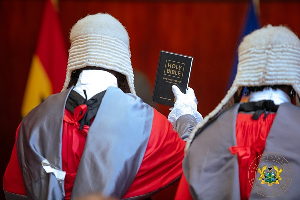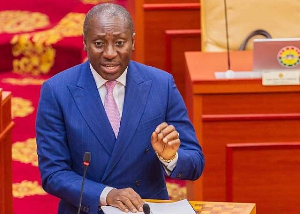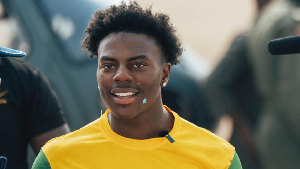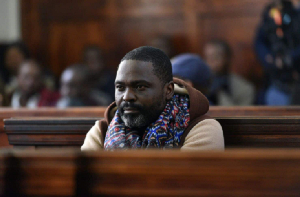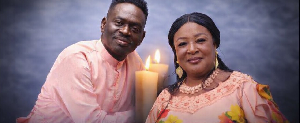Fellow concerned Ghanaians and all well-wishers of the nation, Ghana has a deep gorge gaping at it, and the time is imminent when the whole country will plunge into the bottomless abyss of this gorge if something is not done to bridge it now. I mean now as in “immediately.” Is this nation to become the proudest model of a successful black African nation or one of the shameful eyesores among Africa’s failed states? Please read on, and at the end I hope I would have convinced you to add your voice in favour of slaying this gorgon.
The greatest danger Ghana faces as a nation in the nearest future is a civil war. It is looming if the policy makers and decision centres of this nation do not make haste to avert it. And the only way to avoid this ominous calamity is to do whatever it takes, now and into the future, to correct the glaring social and economic imbalances between the north half of the country and the south half. I am already hearing loud roars of “prophet of doom.” Yes, you may say I’m a doomsayer, but I’m not the only one, to paraphrase John Lennon’s famous line (“You may say I’m a dreamer...”).
On March 27, 2006, Jonathan Adabre posted an article on allAfrica.com titled “Researchers warn on Inequalities and Ethnic Conflict” ( http://allafrica.com/stories/200603270596.html). In it, he alerted all who care to listen about several scholarly pronouncements on what is in store for Ghana if steps are not taken to correct “the widening inequality between the south and the north of the country.” I recommend that all decision makers of the country, present and future, read that article. It is about what reputable and dispassionate researchers think about the peace in Ghana. These include the Institute of African Studies (IAS) of the University of Ghana, the Centre for Research on Inequality (CRISE) of the University of Oxford, and the Universite de Bouake of Cote d'Ivoire. It also mentions names like Dr. Charles Jebuni of the Centre for Policy Analysis (CEPA), Andy McKay of the Overseas Development Institute (ODI), Christian Rogg and Paul Walters, both from the UK’s Department for International Development (DFID), as well as Drs. Ramatu Alhassan and Jacob Songsore, both of the University of Ghana. Want to know about some more academic doomsaying on the subject?
I personally edited and proofread the doctoral dissertation of Dr. Nana Brukum (of blessed memory). You can obtain a copy from the University of Ghana or the University of Toronto. What he writes about is harrowing: jobless youth spending the lean dry seasons drinking alcohol and fighting amongst themselves, young people forced to walk all the way from the north carrying guinea fowl to sell in Kumasi and Accra, the north as a grovelling source of cheap labour for the south (watchmen, cooks, houseboys, farm labourers, mine workers, etc.), general despondency amongst the old and young alike when the rains don’t come and the crops fail, people forced to survive on bitter leaves in times of starvation, and cracked heels supporting distorted feet as a result of a lifetime of walking long distances unshod on hot, parched earth.
If you can’t access Adabre’s piece or Nana Brukum’s dissertation, you sure must be able to get a hand on Moses Yayaha’s article (http://www.ghanaweb.com/GhanaHomePage/features/artikel.php?ID=106743). The crux of the argument of this paper is that the socio-economic development of the northern section of Ghana needs to be made a priority, or else we are all going to pay a hefty price in the near future.
Now, if the academics have warned us but policy makers prefer to turn a deaf ear, what about the numerous examples serving as harbingers all over the miserable continent of Africa? Take Sudan for example. North and South Sudan were pitched against each other for over twenty years on the same issue – the privileging of the Arabic and Islamic north over the Christian and traditional African south in terms of socio-economic development. And the price was over two million lives lost, diversion of scarce national resources into warfare, and the displacement of millions of people. Right now, the Darfur tragedy is raging on in the same country due to the same idiotic policy of inequitable economic and social development practiced in Khartoum.
Then there is Uganda. Joseph Kony and his Lord’s Resistance Army have been able to terrorize the northern region of that nation for more than two decades just because of the neglect it suffers from Kampala. Listen to Olara Otunmi: “In its duration, magnitude, and impact, the situation in northern Uganda exceeds the abominations of Darfur... The population of northern Uganda has been rendered totally vulnerable, trapped between the brutality of the LRA and the genocide being committed by the government. The regime of Yoweri Museveni has invested massively in a campaign of deception and disinformation, aimed at concealing a methodical and comprehensive genocide in northern Uganda, conceived and conducted by the government. (http://allafrica.com/stories/200609190945.html).”
Another example is our very own neighbour – La Cote d’Ivoire. This former African haven of peace and economic prosperity has disintegrated into anarchy, all because of the failure to address this north/south divide monster in a timely and wise manner. As things stand, Yamossoukro is in denial of the fact that the mess in which the country finds itself is all due to the parochialism of regional politics – “we are southerners, you are northerners.”
Some would opine that Ghana has developed beyond the possibility of a civil strife because it has experienced almost fifty years of independence and relative peace during that period. I hasten to remind such complacent people that the United States of America, of all nations, broke into civil war in 1860, over eighty-five years after it had declared independence from the British. And what was it all about? This same north/south divide problem. The south wanted to secede and keep its economic model based on slave ownership, and the north would have none of that. The rest is history.
Enough of references. Now let us look inside our individual consciences, and, in all honesty, try to pinpoint Ghana’s most festering gangrene. There is not a doubt that: 1) being of northern Ghanaian origin puts a person in a disadvantaged position in the hierarchy of all things Ghanaian, 2) that northern Ghanaians resent this, and 3) that some individuals and groups exploit this unfortunate reality for some kind of gain, just or unjust. It is also a known fact that people from southern Ghana (especially the Akan, of which I am one) are wont to think of and refer to northern Ghanaians in unfavourable and derogatory terms. The last time I heard, Ama Benyiwa-Doe, a prominent politician who should know better, was fanning the flames by telling an interlocutor from northern Ghana that “woye tanii’ (http://allafrica.com/stories/200603300669.html). And this was on air. How would she like being told that she is a “hoochie” on the BBC? This kind of deprecation of otherness is too common in Ghana (and in Africa in general), and it speaks volumes about our failure to mature into a nation. Instead, we have remained stuck with our various pre-colonial clannish world-views, like babies at their mothers’ breasts, steadfastly refusing to grow up. Asantes against Ewes, Gas against Asantes, Ibos against Yorubas, Hutus against Tutsis, and so on. How are we going to be able to build a modern nation if we are always clinging to 19th century allegiances, if we keep denigrating a section of our people, and if we perennially allow politicians with vested interests to use these divisions to exploit us? No wonder even Sancho Panza would not accept a kingdom in Guinea as a reward for locating his master’s Dulcinea del Toboso. Costumbres de negros!
Fact is Benyiwa-Doe’s mentality and utterances are symptomatic of a larger manifestation – the neglect, undervaluation, and dehumanization of the people and lands of northern Ghana by the rest of the nation, right from the individual to the highest decision making institutions. Can we all admit that this is unjust and dangerous?
If we have the honesty to admit so, then we all must begin to make amends. Derogation of citizens and lands of the north has to stop in all its exhibitions. It is not right to always refer to a whole people and their geographical region in the pejorative and sentence them to perpertual subservience. Those of us who are black and African, who compete in the international arena, who have been bunched together as “black people” and who have suffered systemic racial discrimination know how painful it is to be alienated, marginalized and vilified on a planet that we all call home. Consequently, we cannot condone any such phenomenon within the little corner of the same planet we call our motherland. We have a duty to discourage any such unfairness any and everywhere, especially in the land of our birth.
Let us respect each other as fellow human beings and Ghanaians wherever we come from, let us develop the nation in a holistic manner, and let us stop ghettoizing our own brothers and sisters just because they happen to come from the Northern or the Volta regions of the country. Go to any city in southern Ghana, and you will find a “zongo.” Mostly, the inhabitants of these zongos are from northern Ghana. I know this for a fact because I grew up in West Africa’s most densely populated zongo – Nima-Maamobi. Every zongo in Ghana is a microcosm of northern Ghana – poor, uber-underdeveloped, functionally illiterate and socially disadvantaged. For most southern Ghanaians, zongo is a synonym for “Hausa” people. And when they say “hausanii” or “hausanyo,” they really mean a northern Ghanaian. What they do not know is that true Hausas are not even Ghanaians (they are Nigerians), and that northern Ghana is composed of a rich mosaic of ethnicities – the Walas, the Sisalas, the Builsas, the Kusals, the Mampuuris, the Dagaris, the Frafras, and so many others. This prevalent lack of knowledge and understanding of the north betrays a systemic ignorance of the region by southerners, which in turn is a salient indicator of the extent to which the land has been neglected by successive governments in Accra in terms of development and how its people have been dehumanized and stereotyped throughout the history of Ghana. It is people from the northern Ghana who come to Accra to pound the fufu, work as “kayayee” and get publicly ridiculed as “tanii,” “pepenii” or “esremnii.”
The potential for an explosion is palpable, and so something has to be done about it. Let us bear in mind that, currently, the most volatile and belligerent spot in the country is Dagbon, which also happens to be the most powerful group in northern Ghana. The truth is that it is easy to get desperate and unemployed young people to do your bidding if you can get them drunk on some local moonshine and replete with cheap food. There is so much idleness and unemployment amongst the youth of northern Ghana that all it will take is a Ghanaian version of Joseph Kony with, for example, Blaise Campaore’s backing, and presto! The whole northern third of Ghana will be lost, resources that should go into education will be spent on war, and the physical and moral rape of women and children will become the new face of Ghana. Is this the kind of Ghana we want? Do we want to disintegrate back into the social structures that obtained in the 18th century or move into the modern 21st century Ghana? Do we retrogress into the pre-colonial tribal fiefdoms or grow the new institution established in 1957? We must make a choice.
I do not want to belabour the subject. What I will say to cap it all is as follows: to eliminate the possibility of an inferno in Ghana in the immediate future, economic and social development must be distributed in a balanced manner regardless of the economic resources a national space may or may not have. Development of the nation must no longer be modelled on the colonial paradigm, i.e., send development only to places where you can mine gold, fell timber or have access to the sea. Socio-economic development of the nation must not be concentrated around the railwayed triangle demarcated by Accra, Kumasi, and Takoradi. Every inch of Ghana is as good as any other, be it Ho soil or Zuarungu soil. And, given the right attention and opportunity, every Ghanaian child has the potential to become a successful and useful citizen regardless of the social and geographical incidences of their birth. One northern city can and must be turned into a modern metropolis with a railway station and an international airport. That city could become the node of a vibrant Sahelian economy, pulling in business from Burkina, Mali, Chad, and Niger. That way, little Kokomba girls would no longer have emigrate to Kumasi or Accra to become “kayayee,” and young Dagomba men would not be easily bought with drinks and food in order for them to go to war on behalf of some royal maniac. Plus, we would have avoided a catastrophe comparable to what we saw and are still seeing in Cote d’Ivoire, Liberia, Uganda, and Sudan.
For an individual human being, fifty years is middle age, but for a nation it is just adolescence. The possibility of a baptism of fire still awaits, but it can be avoided. We have the opportunity now to kill this Medusa. If, on the contrary, we choose to close our eyes, we could soon have our own Joseph Kony, Guillaume Soro, or John Garang on our hands. When that happens, do not ask “but how come nobody warned us about this sinister day?” A stitch in time saves nine.



